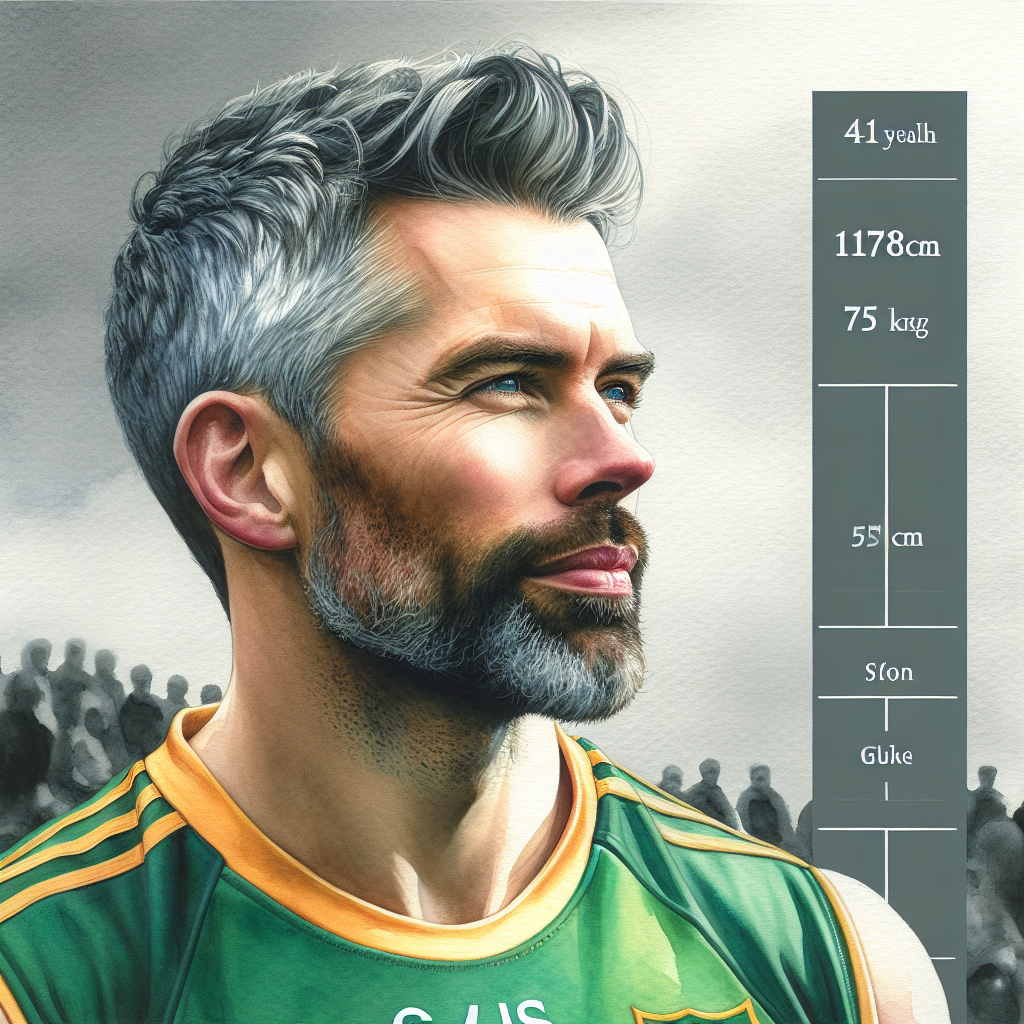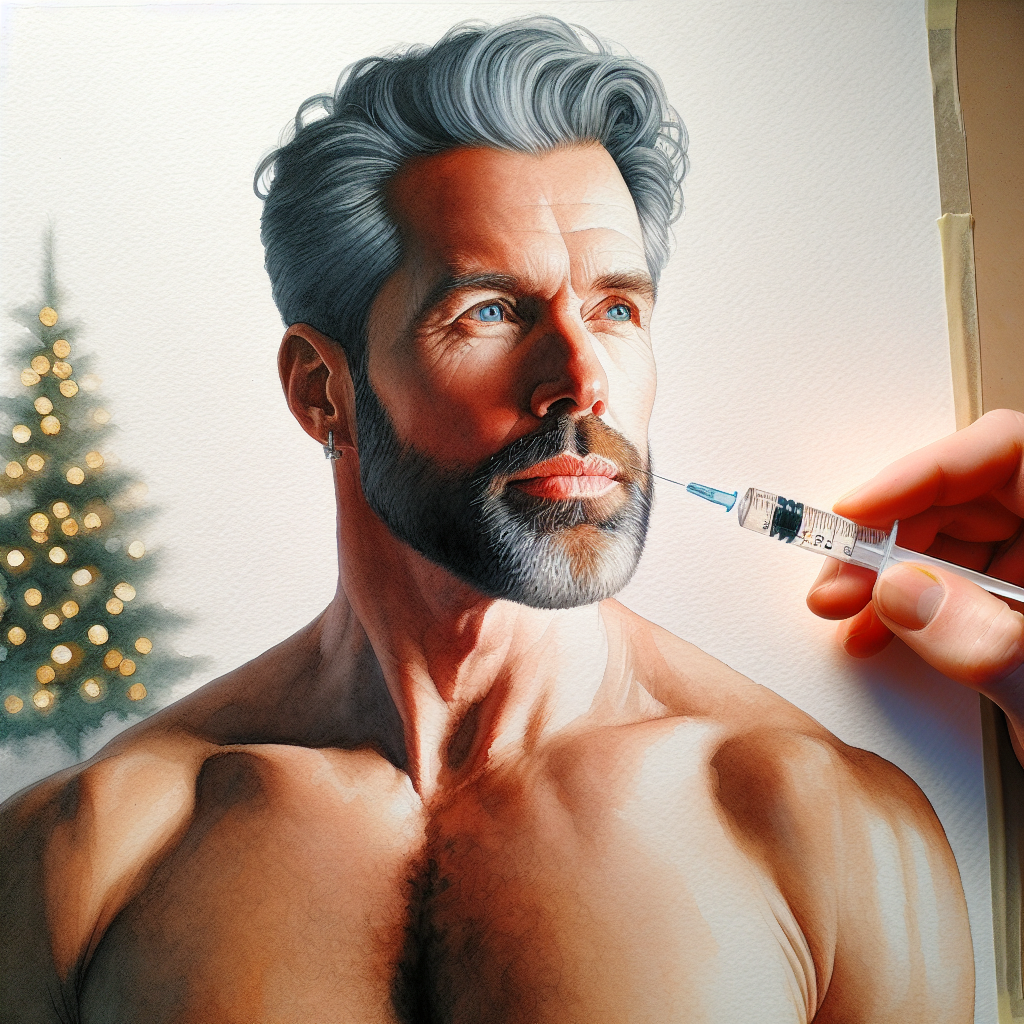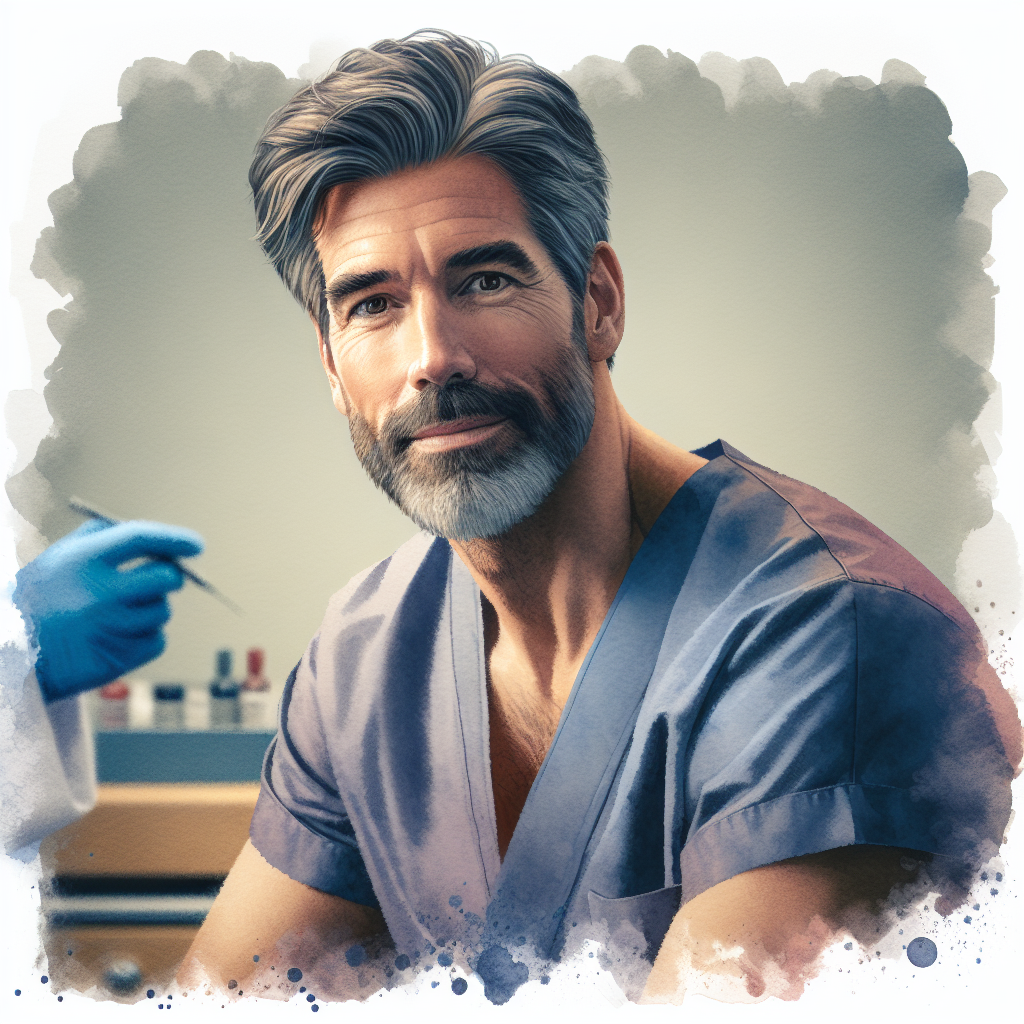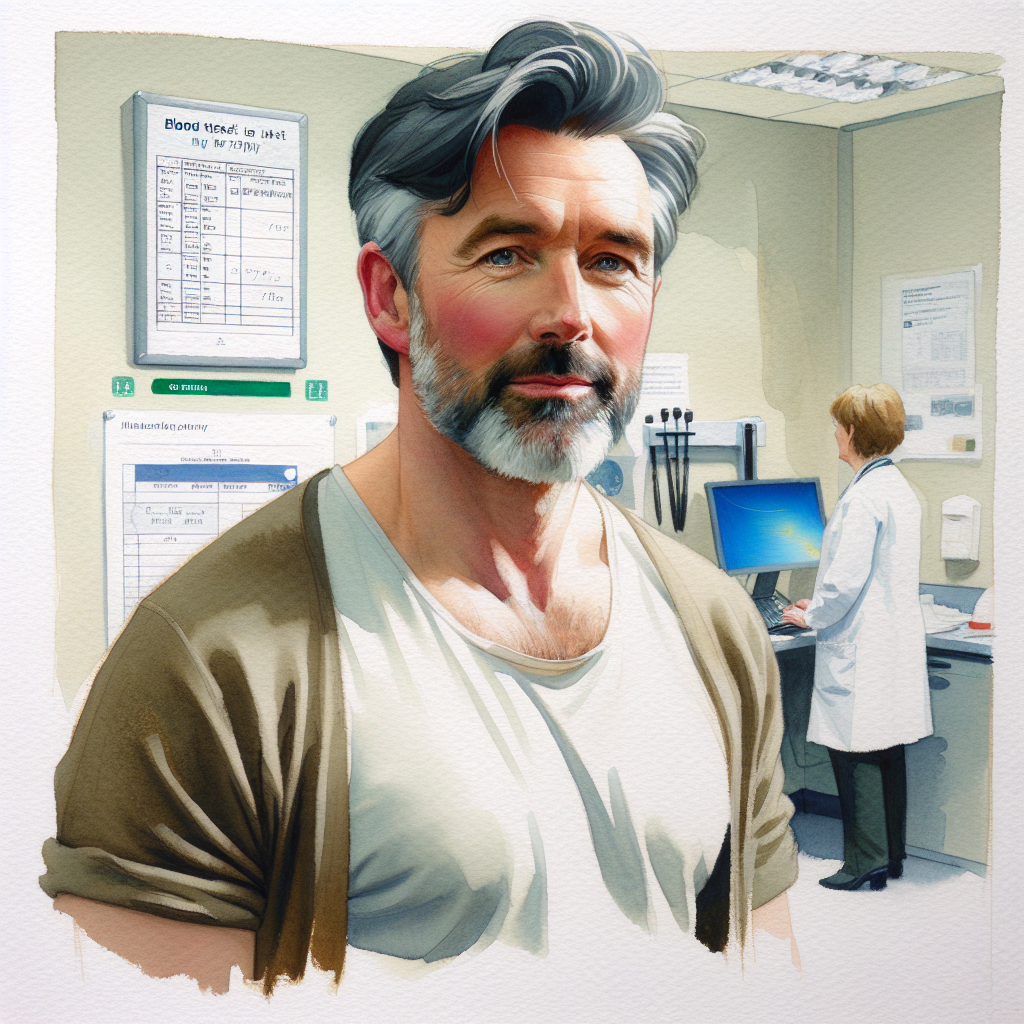Below you will find pages that utilize the taxonomy term “Men's Health”
Why Blood Work Changed My Perspective on TRT

When I first started on TRT, I thought I had it all figured out. I mean, how hard could it be? Stick to the dosage, maybe tweak it a bit, and boom—life’s grand. But then, something happened that made me realise I was only scratching the surface: blood work.
The Wake-Up Call
It was a typical Irish morning—grey skies, a bit of drizzle, and the usual chaos of getting Sarah and Adam ready for school. I was feeling a bit off, more tired than usual, and my mood was all over the place. Jenny, ever the voice of reason, suggested I get my bloods checked. Reluctantly, I agreed.
Overcoming Initial Doubts About Professional TRT

When I first considered starting Testosterone Replacement Therapy (TRT), I’ll admit, I had my doubts. I mean, who wouldn’t? The idea of injecting yourself with hormones sounds like something out of a sci-fi movie, not something a regular lad from Dublin would do. But here’s the thing: sometimes, you’ve got to take a leap of faith, especially when it comes to your health.
The Doubts That Held Me Back
I remember sitting in the doctor’s office, staring at the prescription for Sustanon and HCG, thinking, “Is this really for me?” I’d spent years feeling run down, struggling with low energy, and battling anxiety that Lexapro only partially helped. But the idea of TRT felt… extreme. What if it didn’t work? What if it made things worse? And let’s be honest, the thought of needles didn’t exactly thrill me either.
Tracking Progress: The First Month with a TRT Practitioner
![]()
It’s been a month since I started working with a TRT practitioner, and let me tell you, it’s been a rollercoaster. Between the freezing December weather here in Ireland and the chaos of the holidays, tracking my progress has been both a challenge and a revelation.
The First Steps
When I first walked into the clinic, I was a bit nervous. I mean, who wouldn’t be? You’re handing over your health to someone else, hoping they know what they’re doing. But my practitioner, let’s call him Dr. O’Connor, was a straight shooter. No nonsense, just facts. He explained the process, the potential side effects, and what I could expect in the first few weeks.
How My First Consultation with a Specialist Went

As I sat in the waiting room, flipping through a dog-eared magazine from 2019, I couldn’t help but feel a mix of nerves and anticipation. This was it—my first consultation with a specialist about my TRT journey. The room was quiet, save for the occasional beep from the receptionist’s computer and the distant hum of a vacuum cleaner. It felt like the calm before the storm, or maybe just the calm before a very informative chat.
Finding a Trusted TRT Practitioner in Dublin

If you’re like me, navigating the world of Testosterone Replacement Therapy (TRT) can feel like trying to find a needle in a haystack. Especially here in Dublin, where the options seem endless, but the quality can vary wildly. So, how do you find a trusted TRT practitioner in Dublin? Let me share some tips from my own journey.
Why Trust Matters in TRT
First off, let’s talk about why trust is so crucial when it comes to TRT. This isn’t just about getting a prescription; it’s about your health, your well-being, and your quality of life. A good TRT practitioner will take the time to understand your symptoms, run the necessary tests, and tailor a treatment plan that’s right for you. They’ll also monitor your progress and make adjustments as needed. Trust me, you don’t want to cut corners here.
Why I Quit Underground Labs: Lessons Learned

It’s a cold December morning here in Ireland, and as I sip my coffee, I can’t help but reflect on the journey I’ve been on with TRT. The rain’s lashing against the window, and the kids are already arguing over who gets to use the iPad first. Typical Sunday chaos. But today, I want to talk about something serious: why I quit underground labs for my testosterone needs.
What to Know About Underground Labs and Safety

Let’s talk about something that’s been on my mind lately: underground labs. Now, before you start picturing some mad scientist in a basement, let me clarify. Underground labs, or UGLs, are unregulated facilities that produce everything from supplements to, yes, testosterone. And while they might sound like a quick fix for your TRT needs, there’s a lot more to consider.
The Appeal of Underground Labs
First off, why do people even turn to UGLs? Well, it’s no secret that getting a prescription for TRT can be a bit of a hassle. Between the blood tests, the doctor’s visits, and the endless paperwork, it’s enough to make you want to throw in the towel. And let’s not even get started on the cost. For some, UGLs seem like a more accessible and affordable option.
Reflecting on My Early TRT Choices

It’s a chilly November morning here in Ireland, and as I sit with my cup of tea, I can’t help but reflect on the journey I’ve been on with TRT. The rain’s lashing against the window, and the kids are already arguing over who gets to use the iPad first. Ah, the joys of parenthood! But today, I want to take you back to where it all began—my early days on TRT.
Why I Considered Underground Labs for TRT

Let’s be honest, lads—when it comes to TRT, we’ve all had those moments where we’ve considered taking a shortcut. For me, that moment came last winter, when the days were short, the weather was miserable, and my energy levels were in the gutter. I was on 125mg of Sustanon weekly, but something felt off. My bloods weren’t where I wanted them to be, and I started wondering if I could do better. That’s when I first considered underground labs.
Nine Months After Lockdown: Trying Underground Labs for TRT

It’s been nine months since the lockdown lifted here in Ireland, and like many of you, I’ve been trying to get back to some semblance of normalcy. For me, that meant getting back on track with my TRT (Testosterone Replacement Therapy). But as anyone who’s been on TRT knows, it’s not always straightforward. Between supply chain issues, skyrocketing prices, and the general chaos of post-lockdown life, I found myself considering something I never thought I would: underground labs.
Finding Online TRT Vendors: An Early Exploration

As the leaves turn golden and the crisp autumn air settles in, I find myself reflecting on my journey with testosterone replacement therapy (TRT). It’s been a game-changer for me, but let’s be honest—finding a reliable source for TRT can feel like navigating a minefield. Today, I’m diving into the world of online TRT vendors, sharing my early exploration and what I’ve learned along the way.
Understanding Low Testosterone: Researching During Lockdown

Ah, lockdown. The word alone brings back memories of endless Zoom calls, sourdough starters, and trying to keep the kids entertained while working from home. For many of us, it was a time of reflection and, let’s be honest, a fair bit of stress. But did you know that lockdown might have also had an impact on your testosterone levels? Let’s dive into the research and see what we can uncover.
Reflecting on the Second Year of My TRT Journey

Two years ago, I took the plunge into the world of Testosterone Replacement Therapy (TRT). It’s been a wild ride, lads—full of ups, downs, and a fair few “what the hell is happening now?” moments. As I sit here with a cuppa, watching the rain lash against the window (classic Irish weather, eh?), I can’t help but reflect on how far I’ve come.
The Good, the Bad, and the Bloody Awkward
Let’s start with the good stuff. TRT has been a game-changer for me. My energy levels are more consistent, my workouts feel more productive, and I’ve even managed to shift a bit of the dad bod that had been clinging on like a limpet. But it hasn’t all been smooth sailing. There were times when my hormones felt like they were on a rollercoaster, and I’d be lying if I said I didn’t have a few meltdowns along the way. (Jenny can vouch for that—she’s had to deal with me pacing the kitchen at 2 a.m., ranting about how I’m either too hot or too cold.)
How My Mindset Shifted After Starting TRT

It’s been a wild ride since I started TRT (Testosterone Replacement Therapy) back in April. I’ll be honest, I didn’t know what to expect. I’d heard all the hype—more energy, better focus, improved mood—but I was skeptical. After all, I’d been on Lexapro for years to manage my anxiety, and while it helped, it also left me feeling a bit… flat. Like I was just going through the motions. But TRT? That was a whole new ballgame.
The Role of Support Networks in My TRT Journey

When I first started my TRT journey, I didn’t fully grasp how much of a team effort it would be. Sure, I knew I’d be working closely with my doctor, but I hadn’t considered the broader support network that would become my lifeline. From my family to online communities, these networks have been instrumental in helping me navigate the ups and downs of TRT.
Family: The Backbone of My Support System
My wife, Jenny, has been my rock throughout this journey. She’s the one who encouraged me to seek help when I was struggling with low energy and mood swings. Her support didn’t stop there; she’s been my cheerleader, my sounding board, and sometimes, my reality check. When I started TRT, she was the one who reminded me to stay patient and trust the process.
Why I Decided to Invest in My Health with TRT

It’s a crisp September morning here in Ireland, and the weather’s been as unpredictable as ever. One minute it’s sunny, the next it’s lashing rain—classic Irish summer, eh? But you know what’s not unpredictable? The way I’ve been feeling since I started TRT (Testosterone Replacement Therapy). It’s been a game-changer, and today, I want to share why I decided to invest in my health with TRT.
How Journaling Helped Me Track My TRT Progress

When I first started TRT (Testosterone Replacement Therapy) back in 2021, I was a bit of a mess. My energy levels were all over the place, my mood swings were like a rollercoaster, and I couldn’t tell if the changes I was feeling were from the TRT or just life being life. That’s when I decided to start journaling. And let me tell you, it’s been a game-changer.
The Impact of TRT on My Athletic Performance

As a 41-year-old Irishman juggling family life, work, and the occasional pint at the local pub, I’ve always tried to stay active. Whether it’s chasing after my two kids, Sarah and Adam, or squeezing in a quick workout between meetings, staying fit has been a priority. But let’s be honest—age and life have a way of catching up with you. That’s where TRT (Testosterone Replacement Therapy) came into the picture, and it’s been a game-changer for my athletic performance.
Navigating Holidays While Staying Consistent with TRT

Ah, the holidays. A time for family, feasting, and, let’s be honest, a fair bit of chaos. Whether it’s Christmas, St. Patrick’s Day, or even the odd bank holiday, these breaks from routine can be a double-edged sword. On one hand, they’re a chance to unwind and enjoy time with loved ones. On the other, they can wreak havoc on your TRT routine. And trust me, I’ve been there.
How I Managed Work Stress While on TRT

Ah, work stress. The bane of modern life. Add TRT (Testosterone Replacement Therapy) into the mix, and you’ve got yourself a proper Irish stew of challenges. Let me tell you, lads, it’s been a journey. But here’s how I’ve managed to keep my head above water while juggling work, family, and the occasional pint at the local.
The Work Stress Monster
Work stress is like that one relative who overstays their welcome during Christmas—it just won’t leave you alone. For me, it’s been a constant battle, especially since starting TRT. You’d think the extra testosterone would make me invincible, but no. Stress still finds a way to creep in, especially when deadlines are looming and the kids are bouncing off the walls.
Why TRT Isn't Just About Testosterone

When I first started TRT, I thought it was all about getting my testosterone levels back to where they should be. But as I’ve journeyed through this process, I’ve realized it’s about so much more. It’s not just a hormone fix; it’s a lifestyle overhaul.
The Mental Health Connection
One of the most surprising aspects of TRT has been its impact on my mental health. Before TRT, I was on Lexapro to manage my anxiety. While it helped, it also came with its own set of side effects. TRT has been a game-changer in this regard. It’s not just about feeling physically stronger; it’s about feeling mentally resilient.
How My Relationship with Food Has Changed on TRT

When I started TRT (Testosterone Replacement Therapy) a couple of years ago, I expected changes in my energy levels, mood, and maybe even my gym performance. What I didn’t anticipate was how it would completely shift my relationship with food. It’s been a wild ride, and I’m here to share how TRT has transformed the way I eat, think about food, and even how I cook for my family here in Ireland.
Using Meditation to Enhance TRT Benefits

As someone who’s been on TRT for a while now, I’ve learned that it’s not just about the injections or the numbers on your bloodwork. It’s about the whole package—diet, exercise, sleep, and, yes, even your mental state. That’s where meditation comes in. Now, before you roll your eyes and think, “Ah, here’s Steve going all Zen on us,” hear me out. Meditation isn’t just for yoga enthusiasts or people who chant “om” in their spare time. It’s a tool, and when used right, it can seriously enhance the benefits of TRT.
Why Tracking Metrics Is Critical for TRT
![]()
If you’re on TRT (Testosterone Replacement Therapy) like me, you’ll know it’s not just a ‘set it and forget it’ kind of deal. It’s more like tuning a vintage car—you need to keep an eye on the gauges, adjust the timing, and make sure everything’s running smoothly. And just like that old car, your body needs regular check-ups and fine-tuning. That’s where tracking metrics comes in.
The Unexpected Social Benefits of TRT

When I first started TRT (Testosterone Replacement Therapy), I was focused on the physical benefits—more energy, better muscle tone, and improved libido. But what I didn’t expect were the social benefits that came along with it. Let me tell you, lads, it’s been a game-changer.
Confidence Boost
One of the first things I noticed was a significant boost in my confidence. Before TRT, I’d often second-guess myself in social situations. Whether it was at work, at the pub, or even just chatting with the neighbours, I’d feel a bit… off. But after a few weeks on TRT, I found myself walking into rooms with my head held high. It’s not that I suddenly became the life of the party, but I felt more comfortable in my own skin.
How to Avoid Common TRT Pitfalls

Starting Testosterone Replacement Therapy (TRT) can feel like stepping into a whole new world. It’s exciting, sure, but it’s also a bit like navigating a minefield if you’re not careful. I’ve been on TRT for a while now—125mg of Sustanon weekly plus HCG—and I’ve made my fair share of mistakes along the way. So, let’s dive into some common TRT pitfalls and how you can avoid them.
1. Not Getting Regular Blood Work
One of the biggest mistakes I made early on was not getting regular blood work done. TRT isn’t a set-it-and-forget-it kind of deal. Your body’s response to testosterone can change over time, and without regular blood tests, you’re flying blind. I learned this the hard way when my estrogen levels shot up, and I started feeling like a hormonal teenager again. Trust me, you don’t want that.
Lessons from My First Year of TRT

It’s hard to believe it’s been a year since I started TRT. Time flies when you’re not constantly feeling like a bag of spuds dragged through a hedge backwards. For those of you who’ve been following my journey, you’ll know it hasn’t been all sunshine and rainbows, but it’s been worth every step. Here’s what I’ve learned in my first year of TRT.
The Good
Let’s start with the positives, because who doesn’t love a bit of good news? The most noticeable change has been my energy levels. Before TRT, I was constantly knackered. I’d wake up feeling like I’d been hit by a bus, and by midday, I was ready for a nap. Now, I’m up at the crack of dawn, ready to take on the day. It’s like someone flipped a switch in my brain.
Addressing Plateaus During My TRT Journey

The Journey So Far
When I started TRT (Testosterone Replacement Therapy) a couple of years ago, I was hopeful but also a bit skeptical. At 41, I was feeling the weight of low energy, mood swings, and a general lack of motivation. My doctor suggested TRT, and after some research, I decided to give it a go. Fast forward to today, and I can confidently say it’s been a game-changer. But like any journey, it hasn’t been without its bumps.
The Role of Fasting in Supporting TRT Results

Ah, fasting. It’s one of those things that sounds like torture until you actually give it a go. I remember the first time I tried intermittent fasting—Jenny thought I’d lost the plot entirely. ‘You’re skipping breakfast? Are you mad?’ she asked, as if I’d just announced I was joining the circus. But here’s the thing: fasting isn’t just some fad diet. When done right, it can be a game-changer for your health, especially if you’re on TRT like me.
How I Built a Morning Routine with TRT

Ah, mornings. The bane of my existence for years. If you’d told me a few years ago that I’d be writing about how I love my morning routine now, I’d have laughed in your face. Back then, mornings were a chaotic mess of snoozing alarms, rushing out the door, and forgetting half the things I needed for the day. But since starting TRT (125mg Sustanon weekly plus HCG), I’ve managed to turn things around. Here’s how I built a morning routine that actually works—and why TRT played a big part in it.
The Connection Between Sleep and Hormone Production

Ah, sleep. The one thing we all crave but rarely get enough of. As a 41-year-old Irishman juggling work, family, and the occasional pint at the local, I know all too well the struggle of balancing life and getting a decent night’s rest. But here’s the kicker: sleep isn’t just about feeling refreshed—it’s a cornerstone of hormone production, especially testosterone. So, let’s dive into the nitty-gritty of how sleep and hormones are intertwined, and why you should be paying attention.
How Testosterone Affects Emotional Resilience

How Testosterone Affects Emotional Resilience
Ah, emotional resilience. It’s one of those things you don’t really think about until life throws a curveball your way. For me, that curveball came in the form of anxiety and stress, which I’ve been managing with the help of TRT (125mg Sustanon weekly plus HCG) and, at one point, Lexapro. But let’s not get ahead of ourselves. Today, we’re diving into how testosterone affects emotional resilience, and I’ll be sharing some personal anecdotes along the way.
Looking Ahead: Long-Term Health Goals on TRT

As I sit here, sipping on a cup of Barry’s Tea, I can’t help but reflect on the journey I’ve been on with TRT. It’s been a rollercoaster, but one that’s brought me to a place where I can finally start thinking about the long-term. You see, when you’re on TRT, it’s not just about the here and now—it’s about setting yourself up for a healthier, happier future. And that’s exactly what I want to chat about today.
Balancing TRT with Work, Family, and Life

Life is a juggling act, isn’t it? Between work deadlines, school runs, and trying to squeeze in a bit of ‘me time,’ it’s a wonder any of us get through the day. Throw testosterone replacement therapy (TRT) into the mix, and suddenly, you’ve got another ball to keep in the air. But here’s the thing—it’s not impossible. In fact, with a bit of planning and a dash of Irish wit, you can make it work. Let me tell you how.
Advice for Those Considering TRT After My Journey

If you’re reading this, chances are you’re considering testosterone replacement therapy (TRT). Maybe you’ve been feeling sluggish, unmotivated, or just not yourself lately. Or perhaps your GP has mentioned your testosterone levels are lower than they should be. Whatever the reason, I’m here to share my journey and offer some advice—straight from the heart of a 41-year-old Irish lad who’s been on TRT for a while now.
Why I Started TRT
Let me take you back a few years. I was in my late 30s, juggling work, family life with Jenny and the kids (Sarah and Adam), and trying to keep up with my mam, Mary, who’s still as sharp as a tack. But something felt off. I was tired all the time, even after a full night’s sleep. My workouts felt like dragging a tractor through mud, and my mood? Let’s just say I wasn’t winning any ‘Husband of the Year’ awards.
How I Stay Consistent with My TRT Routine

Staying consistent with my TRT routine has been a game-changer for me. It’s not always easy, especially with the chaos of family life, but it’s worth it. Let me walk you through how I’ve managed to stick to it, even when life throws curveballs.
The Importance of Routine
When I first started TRT, I thought it would be a breeze. Inject a bit of Sustanon, take some HCG, and boom—I’d be the picture of health. But as anyone on TRT knows, it’s not that simple. Consistency is key. Missing a dose or skipping a blood test can throw everything off balance.
A Year on TRT: Transformations and Lessons Learned

It’s hard to believe it’s been a full year since I started TRT. Time flies when you’re not constantly battling brain fog, fatigue, and the general malaise that comes with low testosterone. I’ll be honest—when I first started this journey, I didn’t know what to expect. I was hopeful, sure, but also a bit skeptical. Could a weekly injection really turn things around for me? Spoiler alert: it did, but not without a few bumps along the way.
Why Regular Check-Ins Are Key for TRT Success

As someone who’s been on TRT for a while now, I can tell you one thing: it’s not a ‘set it and forget it’ kind of deal. If you’re serious about getting the most out of your testosterone replacement therapy, regular check-ins are absolutely crucial. And no, I’m not just talking about the occasional blood test—though those are important too. I’m talking about a consistent, ongoing dialogue with your healthcare provider, and a bit of self-awareness thrown in for good measure.
Reflecting on My Mental Health Six Months on TRT

Six months ago, I started testosterone replacement therapy (TRT). At the time, I was a bit of a mess—low energy, brain fog, and anxiety that felt like it was running my life. Fast forward to today, and I’m sitting here with a cup of tea (yes, tea—I’m Irish, after all) reflecting on how far I’ve come. It’s been a journey, and I want to share it with you.
Using Exercise to Amplify the Benefits of TRT

If you’re like me—a 41-year-old Irish lad juggling TRT, family life, and the occasional pint at the local—you’ve probably wondered how to get the most out of your testosterone replacement therapy. Well, let me tell you, exercise is the secret sauce. It’s not just about lifting weights or running laps; it’s about amplifying the benefits of TRT in ways that can transform your life.
Why Exercise Matters on TRT
When I started TRT, I noticed a boost in energy and mood, but it wasn’t until I paired it with regular exercise that I truly felt like a new man. Exercise helps your body utilize testosterone more efficiently, improving muscle mass, fat loss, and overall well-being. It’s like giving your TRT a turbo boost.
How My Diet Changed with TRT

When I started TRT (Testosterone Replacement Therapy) back in 2022, I knew it would change my life. What I didn’t expect was how much it would change my diet. Sure, I’d read about the importance of nutrition for testosterone levels, but I didn’t realise how much my eating habits would shift once my hormones were balanced. Let me take you through the journey—because, let’s face it, food is life, especially when you’re Irish.
Three Months on TRT: Adjusting to My New Normal

It’s been three months since I started Testosterone Replacement Therapy (TRT), and I’ve got to say, it’s been a wild ride. If you’ve been following along, you’ll know I’m not one to sugarcoat things. So, let’s dive into the good, the bad, and the downright weird of adjusting to my new normal.
The Energy Boost
One of the first things I noticed was the energy boost. It’s like someone flipped a switch. I’m not talking about bouncing-off-the-walls energy, but a steady, consistent flow that keeps me going throughout the day. It’s been a game-changer, especially with two young kids running around. Sarah and Adam have more energy than a GAA team on match day, so keeping up with them has been a lot easier.
Why Regular Blood Work is Crucial for TRT Success

If you’re on TRT, you’ve probably heard the phrase, “It’s not a set-it-and-forget-it treatment.” And trust me, as someone who’s been on TRT for a while now, I can tell you that’s the gospel truth. One of the most critical aspects of TRT success? Regular blood work. It’s not just a box-ticking exercise—it’s your roadmap to feeling your best and avoiding potential pitfalls.
Why Blood Work Matters
Let’s start with the basics. TRT isn’t just about injecting testosterone and hoping for the best. It’s about finding the sweet spot where your body feels balanced, your energy is up, and your mood is stable. But here’s the kicker: everyone’s body is different. What works for me might not work for you, and that’s where blood work comes in.
How My Life Has Changed Six Months Into Professional TRT
Six months ago, I made the decision to start professional Testosterone Replacement Therapy (TRT). It wasn’t a decision I took lightly, but after years of feeling like I was running on empty, I knew something had to change. Now, half a year in, I can confidently say that TRT has been a game-changer for me. Let me walk you through how my life has transformed.
The Energy Boost
Before TRT, I felt like I was dragging myself through the day. Even simple tasks felt like climbing a mountain. Now, I wake up with a spring in my step. The energy boost has been incredible. I’m not just talking about physical energy, though that’s been a huge part of it. Mentally, I feel sharper, more focused. It’s like someone turned the lights back on in my brain.
The Role of Mental Health Support While on TRT

As I sit here, sipping on a cup of Barry’s Tea, I can’t help but reflect on the journey I’ve been on with TRT. It’s been a rollercoaster, to say the least. The physical changes are one thing, but the mental and emotional shifts? That’s where the real challenge lies. Today, I want to talk about the role of mental health support while on TRT, because let’s face it, it’s not just about the injections and the blood tests—it’s about keeping your head above water too.
How I Built an Exercise Plan Around TRT

When I started TRT (Testosterone Replacement Therapy) back in 2019, I knew it wasn’t just about the injections. It was about rebuilding my body, my energy, and my life. At 41, with two kids under six and a wife who deserves more than a couch potato for a husband, I had to get serious about my fitness. But here’s the thing: TRT isn’t a magic pill. It’s a tool, and like any tool, you’ve got to use it right. So, I set out to build an exercise plan that would work with my TRT, not against it.
Month 3 on TRT with a Practitioner: Settling into a Routine

Well, lads, here we are—three months into my TRT journey, and I’m finally starting to feel like I’ve got a handle on things. It’s been a bit of a rollercoaster, but I’m settling into a routine now, and I’ve got to say, it’s making a world of difference. Let me take you through the highs, the lows, and the lessons learned so far.
The Routine: Finding My Groove
When I started TRT back in April, I was a bit all over the place. Between figuring out the right dosage, managing the injections, and dealing with the occasional mood swings, it felt like I was constantly playing catch-up. But now, three months in, I’ve got a solid routine going, and it’s made a massive difference.
Addressing Anxiety About Long-Term TRT Commitment

Ah, the joys of summer in Ireland. The sun’s been out more than usual this July, and I’ve been making the most of it with Jenny and the kids. Sarah and Adam have been running around the garden like mad things, and I’ve been trying to keep up. But you know what’s been on my mind lately? The long-term commitment to TRT. It’s a big decision, and I get why some lads feel anxious about it. So, let’s have a chat about it, shall we?
Why a Professional Approach to TRT Made All the Difference

When I first started looking into Testosterone Replacement Therapy (TRT), I was a bit like a bull in a china shop. I thought I could just wing it, maybe read a few forums, and figure it all out on my own. But let me tell you, that approach was about as effective as a chocolate teapot. It wasn’t until I took a professional approach to TRT that things really started to turn around for me.
Month 1 with a TRT Practitioner: Early Results

It’s been a month since I started working with a TRT practitioner, and let me tell you, it’s been a wild ride. For those of you who’ve been following my journey, you’ll know I’ve been open about my struggles with low testosterone and anxiety. After years of feeling like I was running on empty, I finally decided to take the plunge and explore TRT. And now, a month in, I’m ready to share the early results.
My First Appointment with a TRT Specialist

It was a grey, drizzly morning in June 2020 when I walked into the clinic for my first appointment with a TRT specialist. The weather felt fitting—like the universe was setting the tone for what I expected to be a serious, life-changing conversation. I’d been wrestling with low energy, brain fog, and a general sense of ‘what’s the point?’ for months. After a bit of Googling (and a few too many late-night Reddit rabbit holes), I decided it was time to get my testosterone levels checked.
Finding a New TRT Practitioner in Dublin: A Fresh Start

Moving to a new city is always a bit of a whirlwind, especially when you’re juggling family life, work, and, in my case, TRT. When Jenny and I decided to move to Dublin last year, one of the first things on my mind was finding a new TRT practitioner. It’s not exactly the kind of thing you can put off, especially when you’re on a weekly regimen like me (125mg Sustanon plus HCG, for those keeping score).
Reflecting on Early Mistakes in My TRT Journey

When I first started my TRT journey, I was as green as the fields of Kerry in spring. I thought I had it all figured out—just take the testosterone, and everything would fall into place. Boy, was I wrong. Looking back, I can see the mistakes I made, and I want to share them with you so you can avoid the same pitfalls.
1. Not Doing Enough Research
I’ll admit it—I didn’t do nearly enough research before starting TRT. I was so focused on the potential benefits that I didn’t fully understand the risks or the commitment involved. I didn’t know about the importance of regular blood tests or how to interpret them. I was flying blind, and it showed.
The Importance of Trustworthy Medical Guidance for TRT

Let’s be honest, lads—when it comes to testosterone replacement therapy (TRT), there’s a lot of shite out there. Between dodgy online forums, self-proclaimed “experts,” and the occasional lad at the pub who swears he knows everything about hormones, it’s easy to get lost in the noise. But here’s the thing: TRT isn’t something you want to mess around with. It’s not like trying a new protein powder or switching up your gym routine. This is your health we’re talking about, and it deserves proper, trustworthy medical guidance.
Why I Quit TRT After Trying Underground Labs

It’s been a wild ride, lads. If you’ve been following my journey, you know I’ve been on TRT for a while now—125mg of Sustanon weekly, plus a bit of HCG to keep the boys downstairs in working order. But today, I’m here to talk about the darker side of TRT: underground labs. And why, after dipping my toes into that murky water, I decided to quit altogether.
What I Learned About Underground Labs and Safety

When it comes to testosterone replacement therapy (TRT) and supplements, there’s a lot of talk about underground labs (UGLs). These are the unregulated, often shadowy operations that produce everything from testosterone to HCG, often at a fraction of the cost of pharmaceutical-grade products. But as the old saying goes, ‘If it sounds too good to be true, it probably is.’ And let me tell you, I’ve learned this the hard way.
Nine Months After Lockdowns: Trying Underground Labs for TRT

It’s been nine months since the world went into lockdown, and like many of you, I’ve been navigating the ups and downs of life in a pandemic. For me, that’s meant juggling TRT (125mg Sustanon weekly plus HCG), managing anxiety without Lexapro, and trying to keep my sanity while homeschooling Sarah and Adam. Oh, and let’s not forget the endless Zoom calls that make me question why I ever complained about commuting.
The Psychological Impact of Low Testosterone During Isolation

As we navigate through these unprecedented times of isolation, it’s crucial to talk about something that’s often overlooked: the psychological impact of low testosterone. I’m Steve, a 41-year-old Irishman, and I’ve been on TRT (Testosterone Replacement Therapy) for a while now. Let me tell you, the connection between testosterone levels and mental health is more significant than most people realize.
The Isolation Effect
Isolation can be tough on anyone, but for men with low testosterone, it can be particularly challenging. Testosterone isn’t just about muscle mass and libido; it plays a vital role in our mood, energy levels, and overall mental well-being. When you’re stuck at home, away from your usual routines and social interactions, these effects can become even more pronounced.
Finding Online TRT Vendors: The First Step

If you’re reading this, chances are you’re considering testosterone replacement therapy (TRT) or have already decided to take the plunge. Maybe you’re like me—a 41-year-old Irish lad who’s been on TRT for a while now—and you’re wondering where to start. Well, the first step is finding a reliable online TRT vendor. And let me tell you, it’s not as straightforward as ordering a pint of Guinness.
What is TRT? Initial Research During Lockdown

What is TRT? Initial Research During Lockdown
It was early April 2020, and Ireland was deep into its first COVID-19 lockdown. The weather was as unpredictable as ever—one day it was sunny, the next it was lashing rain. I remember sitting in my home office, staring at the rain pelting against the window, and thinking, What the hell am I going to do with all this time?
For context, I’m Steve, a 41-year-old Irishman living in Dublin with my wife Jenny and our two kids, Sarah and Adam. Like many others, I was struggling with the sudden shift to working from home, homeschooling the kids, and trying to keep my sanity intact. But amidst the chaos, I found myself diving headfirst into something I’d been curious about for a while: Testosterone Replacement Therapy (TRT).